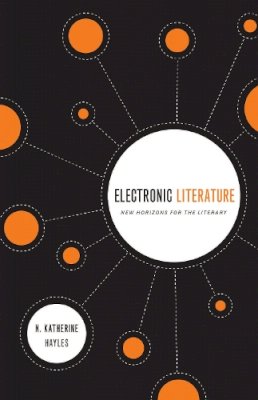
Stock image for illustration purposes only - book cover, edition or condition may vary.
Electronic Literature
N. Katherine Hayles
FREE Delivery in Ireland
Description for Electronic Literature
Paperback. Designed to help electronic literature move into the classroom, this book addresses its major genres, the challenges it poses to traditional literary theory, and the complex and compelling issues at stake. It develops a theoretical framework for understanding how electronic literature draws on the print tradition. Series: Ward-Phillips Lectures in English Language & Literature. Num Pages: 192 pages, 15 colour illustrations. BIC Classification: DSB. Category: (P) Professional & Vocational; (UP) Postgraduate, Research & Scholarly; (UU) Undergraduate. Dimension: 215 x 142 x 13. Weight in Grams: 416.
A visible presence for some two decades, electronic literature has already produced many works that deserve the rigorous scrutiny critics have long practiced with print literature. Only now, however, with Electronic Literature by N. Katherine Hayles, do we have the first systematic survey of the field and an analysis of its importance, breadth, and wide-ranging implications for literary study. Hayles's book is designed to help electronic literature move into the classroom. Her systematic survey of the field addresses its major genres, the challenges it poses to traditional literary theory, and the complex and compelling issues at stake. She develops a ... Read moretheoretical framework for understanding how electronic literature both draws on the print tradition and requires new reading and interpretive strategies. Grounding her approach in the evolutionary dynamic between humans and technology, Hayles argues that neither the body nor the machine should be given absolute theoretical priority. Rather, she focuses on the interconnections between embodied writers and users and the intelligent machines that perform electronic texts. Through close readings of important works, Hayles demonstrates that a new mode of narration is emerging that differs significantly from previous models. Key to her argument is the observation that almost all contemporary literature has its genesis as electronic files, so that print becomes a specific mode for electronic text rather than an entirely different medium. Hayles illustrates the implications of this condition with three contemporary novels that bear the mark of the digital.
Included with the book is a companion website (https://newhorizons.eliterature.org/index.php) and an online resource, The Electronic Literature Collection, Volume 1 (https://collection.eliterature.org/1/). The companion website offers resources for teachers and students, including sample syllabi, original essays, author biographies, and useful links. The ELC contains sixty new and recent works of electronic literature with keyword index, authors' notes, and editorial headnotes. Representing multiple modalities of electronic writing—hypertext fiction, kinetic poetry, generative and combinatory forms, network writing, codework, 3D, narrative animations, installation pieces, and Flash poetry—the collection encompasses comparatively low-tech work alongside heavily coded pieces. Together, the book, companion website, and collection provide an exceptional pedagogical opportunity.
Show Less
Product Details
Publisher
University of Notre Dame Press United States
Series
Ward-Phillips Lectures in English Language & Literature
Place of Publication
Notre Dame IN, United States
Shipping Time
Usually ships in 7 to 11 working days
About N. Katherine Hayles
Katherine Hayles is Professor of Literature and Director of Graduate Studies in the Literature Program, Duke University. She is the author of a number of books, including My Mother Was a Computer: Digital Subjects and Literary Texts.
Reviews for Electronic Literature
“Electronic literature is an emerging literary genre that challenges the traditional understanding of literary criticism and theory. It is this challenge, in part, that is responsible for keeping the emerging genre out of the classroom, and with this work, Hayles means to grant it entry. Drawing on technology-related literary criticism and theory, she creates a new space for electronic literature ... Read moreto be read and understood. She argues that the impact of the digital on modern writing cannot be underestimated.” —Library Journal "Kate Hayles stays with a text, whether electronic or otherwise, like almost no other reader or player, inhabiting each work with care and caring, transforming its material specificity to embodied sense and sensuality rather than a hollow category. In the course of defining a field she has set it abloom and in the process refreshed our imagination." —Michael Joyce, Vassar College “Kate Hayles has been there since the beginning. She helped formulate the field of digital literature. All readers will be charmed by her new book; high school and college literature and art teachers, in particular, will find this book immediately helpful to introducing students to creative writing in a new media mode.” —Thom Swiss, University of Minnesota “In Electronic Literature, N. Katherine Hayles has delivered a wonderfully structured synthetic overview of writers, texts, critics, and publication venues for the field of electronic literature. In it, she has managed to articulate a non-canonical canon, a body of work and set of ideas that are flexible rather than fixed, inclusive rather than exclusive.” —Rita Raley, University of California, Santa Barbara “No critic, save N. Katherine Hayles, has the wide grasp of literary criticism, new media history and technology, cyberculture and its philosophical implications, and the interplay between electronic and print imaginative writing. Now, in the five straightforward, readable chapters of
Electronic Literature
, she supplies the tools and builds the contexts necessary for everyone to grasp the importance of her topic and integrate it into her or his own knowledge base. For those new to electronic literature, it provides an intellectual, historical, and technical basis for inserting it into the curriculum; for those familiar with the digital arts and electronic literature, it provides a succinct overview of what has been accomplished in the field and what remains to bring this work from the hands of practitioners and theorists into the classroom. The book and CD package will be snapped up by scholars and students alike.” —Dee Morris, University of Iowa Show Less

